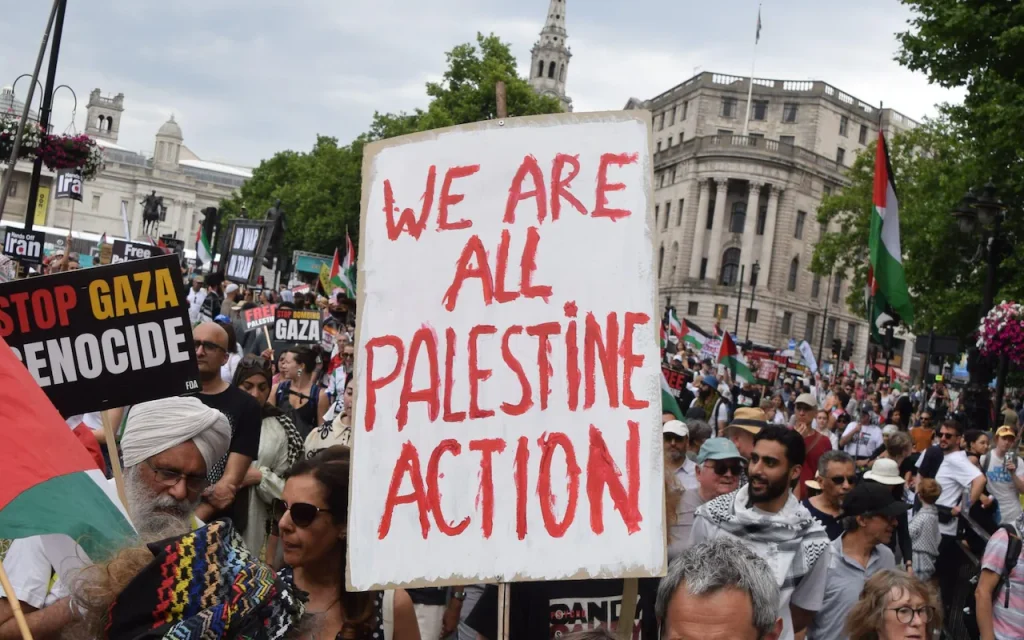In a dramatic escalation of political tension, pro-Palestinian demonstrators have been banned from protesting outside Parliament, as police imposed one of the most restrictive exclusion zones in modern British history. The move comes amid heightened security concerns and growing calls to classify Palestine Action as a terrorist organisation.
The Metropolitan Police announced the enforcement of a strict exclusion zone covering Parliament Square, Whitehall, Westminster Bridge, Victoria Embankment, and Charing Cross, with protesters facing arrest if they enter the area.
According to authorities, the measure—enabled under the Public Order Act—permits officers to stop and search individuals suspected of protesting and confiscate materials intended for demonstrations. Breaching the exclusion order could result in up to one month in prison and a £1,000 fine.
Tightest Restrictions in Years
The ban is a direct response to a planned protest by Palestine Action, a group accused of escalating its tactics beyond peaceful protest. In a statement, police said that while the right to protest remains fundamental, “actions in support of such a group go beyond what most would see as legitimate protest.”
Protesters will now only be allowed to demonstrate in central London between 12 p.m. and 3 p.m., and must avoid the designated exclusion zone. In response, Palestine Action relocated its protest to Trafalgar Square, just outside the restricted area.
Terror Classification Looms
Home Secretary Yvette Cooper is expected to announce plans to proscribe Palestine Action as a terrorist organisation as early as Monday. If enacted, the group would be placed on the same legal footing as Hamas, al-Qaeda, and Islamic State, with supporters and members facing prison terms of up to 14 years.
The move follows a series of high-profile incidents involving the group, including damaging two military aircraft at RAF Brize Norton, with losses potentially running into millions. Members have also been accused of attacking police officers, damaging private property, and staging illegal break-ins at military-linked facilities.
Backlash and Public Debate
Palestine Action issued a defiant statement on social media, accusing the police of suppressing dissent:
“The Metropolitan Police are trying to deter support from Palestine Action by banning the protest from taking place at the Houses of Parliament. Don’t let them win!”
Critics of the ban argue it undermines the democratic right to protest, particularly on issues of foreign policy and human rights. Civil liberties groups have warned that the government is using anti-extremism laws to silence political activism.
MPs, Peers Raise Alarm Over Safety
The crackdown follows warnings from Lord Walney, the former government adviser on political violence, who said pro-Palestinian demonstrations outside Parliament had “harassed, intimidated, and obstructed” lawmakers. He claimed that MPs and peers are being put at personal risk, saying:
“Parliamentarians feel afraid to go to work. That is a direct threat to democracy.” Earlier this month, over 60 members of the House of Lords called for a full review of Parliament’s security protocols, citing growing concerns about confrontational tactics used by protest groups.
Palestine Action Under Scrutiny
It is widely reported that Palestine Action has been gaining notoriety for its aggressive tactics, including trespassing on private property and vandalizing buildings connected to Israeli defense firms. Co-founder Richard Barnard is currently awaiting trial on charges of inciting criminal damage and allegedly expressing support for Hamas during past rallies.
As political pressure mounts, and the line between protest and extremism is hotly debated, the UK faces a defining moment over the limits of dissent and the rights of the state to preserve order near the seat of its democracy.
New Daily Prime will continue to monitor developments as this story unfolds.
Read Also:
Starmer urged to ban IRGC following crackdown on palestine action
Israeli overnight airstrikes kill 320 Palestinians, shattering truce deal



